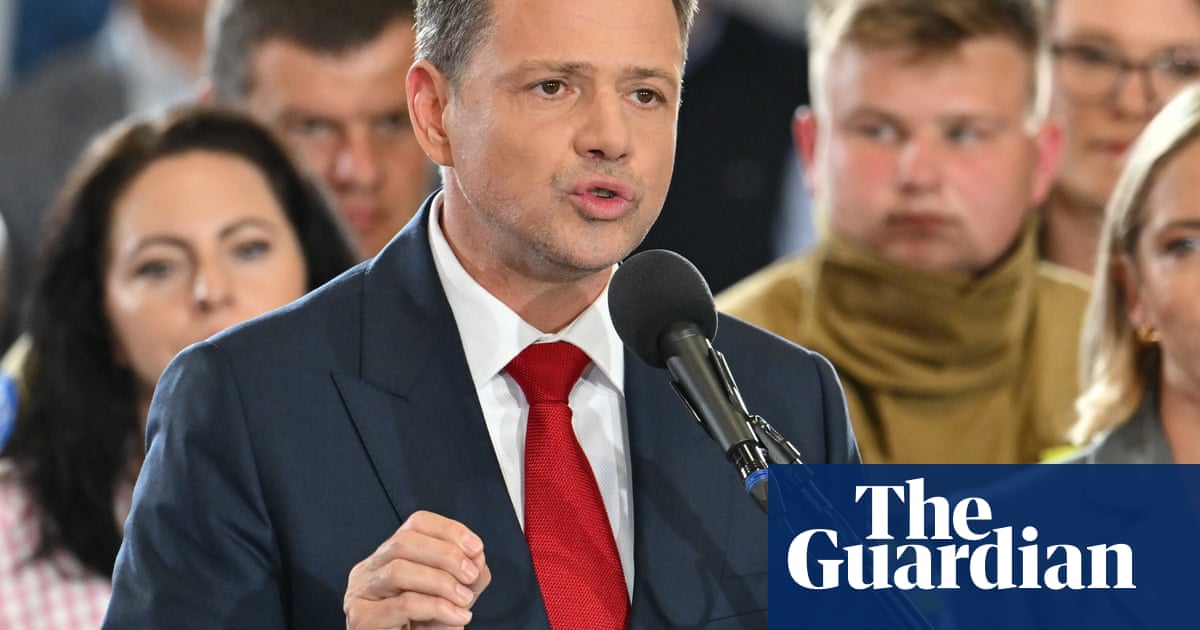The pro-European centrist Rafał Trzaskowski and historian Karol Nawrocki, backed by the populist right, have each secured about 30% of the vote in a nail-bitingly close first round of Poland’s presidential election.
The vote sets the stage for a runoff round that will force voters to choose between starkly different visions of the country’s future.
An exit poll by the Ipsos institute, released as voting closed on Sunday, suggested Trzaskowski, the mayor of Warsaw and candidate from the prime minister Donald Tusk’s Civic Coalition, had claimed 30.8% of the vote in the first round. Trailing him was Nawrocki, who has been endorsed by the Law and Justice party (PiS), with 29.1% of the vote.
Trzaskowski had long been the favourite to win the election, but his lead over Nawrocki had narrowed in recent weeks. The exit poll, however, points to a first-round result that was closer than anticipated between the frontrunners, yielding a result that is likely to make Trzaskowski and Tusk nervous.
Soon after the exit poll was released, Tusk reacted on social media. Everything was at stake now, he wrote, adding that “the next two weeks will decide the future” ofPoland. “Not one step back!”he said.
The outgoing president,Andrzej Duda, is a close ally of the previous PiS government and a supporter of Donald Trump. He opposed the changes pursued by the new administration and blocked some decisions, including ambassadorial nominations.
A potential opposition win would extend the current deadlock, prompting years of political instability.
The official results of the first round, in which 13 candidates vie to be elected as president, are expected on Monday or Tuesday.
The two candidates will face off against each other in a runoff vote on 1 June, with voters asked to decide between Trzaskowski’s promises of reforming judicial institutions and rebuilding democratic institutions and Nawrocki’s admiration of Donald Trump, strong anti-migration rhetoric and pledges to crack down on “woke” liberal values.
The supporters of Sławomir Mentzen, a libertarian far-right candidate who came in third place with 15.4% of the vote on Sunday, according to exit polls, could prove key to the second round. A Eurosceptic who is staunchly opposed to abortion and migrants, Mentzen had taken aim at the country’s 1 million Ukrainian refugees, accusing them of taking advantage ofPoland.
The high number of votes for Mentzen suggested he had benefited from frustrated votersseeking to breakthe country’s two-party hold on power.
Speaking after the results were announced, Trzaskowski warned voters that Nawrocki was a “radical” politician and would cause even further disruption in the country’s heavily polarised politics.
Meanwhile, Nawrocki made a direct appeal to third-placed Mentzen, urging him and his voters to help him “save Poland” and “stop Donald Tusk’s march to monocracy”.
In another surprising turn, 6.2% of voters backed Grzegorz Braun, according to the exit poll, catapulting the lawmaker from the right-wing Confederation party into fourth place. Braun isunder investigationafter he used a fire extinguisher to put out Hanukah candles in the Polish parliament in a protest against the celebration of Jewish holidays and, two weeks ago, the European parliament voted to lift his immunity as a European lawmaker.
Sign up toThis is Europe
The most pressing stories and debates for Europeans – from identity to economics to the environment
after newsletter promotion
Trzaskowski has struggled to make inroads in rural areas, even as Nawrocki’ssupporthas fallen as questions swirl over the circumstances in which he bought a flat from an elderly man, with suggestions that he failed to meet his obligations to provide care as part of the transaction. He has denied the allegations.
The vote for Poland’s next president, a position that shapes foreign policy and can be used to introduce and veto legislation,has been castas a “make or break” moment for the country’s pro-European coalition government.
Led by Tusk, the coalition features an unwieldy mix of parties that span the political spectrum. Since taking power in late 2023 after eight years in which PiS was accused of eroding democratic checks and balances and becoming increasingly authoritarian, the coalition’s ability to follow through on promises such as reforming the justice system, liberalising abortion laws and introducing same-sex civil partnerships has been in part stymied by the outgoing president, Andrzej Duda.
The stalemate loomed over the presidential election, turning the ballot into a question of whether voters wanted to carry through with the political overhaul that began in 2023 when PiS was ousted from power in the country’s parliament.
“The stakes are enormous for the ruling coalition and for those concerned with the future of Polish democracy,” Jacek Kucharczyk, president of the Institute of Public Affairs, a Warsaw thinktank, told the Associated Press. “This is about democratic reform and restoring the rule of law – and that can only happen with cooperation from the next president.”
The sentiment was echoed by Tusk, who last month said the stakes were “as high” as they had been in the 2023 election. “It’s hard to govern alongside a hostile president, with all those vetoes,” he told parliament.
The election was being closely watched by many across Europe. Bordering Russia’s Kaliningrad exclave, Belarus and war-torn Ukraine, Poland has been a key logistics hub for military aid to Ukraine and, under Tusk’s leadership, has been a key voice against Russia on Nato’s eastern flank.
The election is also likely to prove pivotal for Law and Justice. “With Nawrocki as president, the government would be paralysed and that could eventually lead to the fall of the ruling coalition,” political scientist Anna Materska-Sosnowska told AFP.
It could mean “the return of the populists with renewed force” at the next general election, she added.
